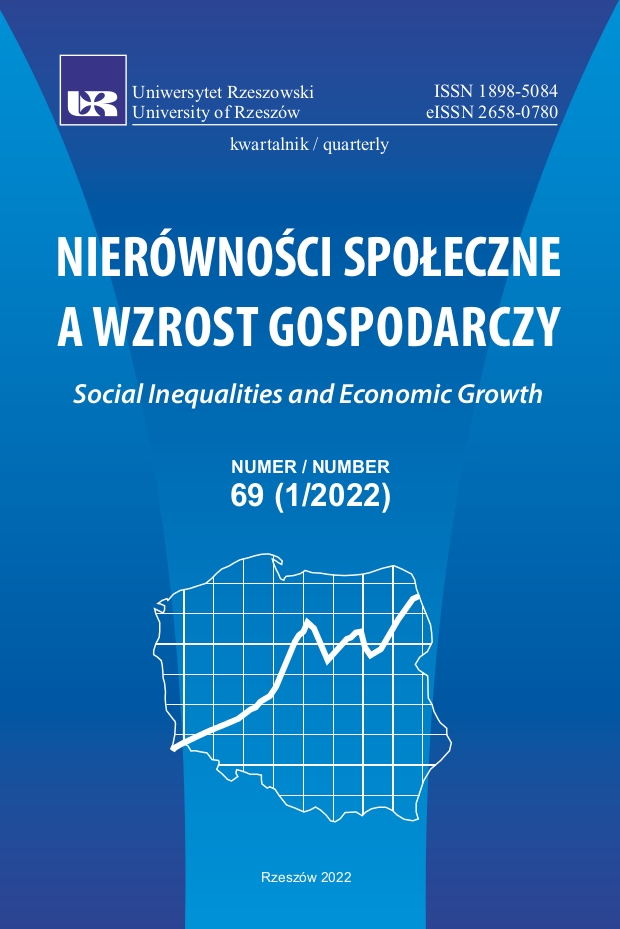Obsługa celna a zrównoważony rozwój przedsiębiorstw
DOI:
https://doi.org/10.15584/nsawg.2022.1.9Słowa kluczowe:
zrównoważony rozwój, obsługa celna, organy celne, e-usługi, przedsiębiorstwoAbstrakt
Celem artykułu jest charakterystyka istoty obsługi celnej w kontekście zrównoważonego rozwoju przedsiębiorstw, a także omówienie jej wybranych instrumentów mających charakter proekologicznych rozwiązań, tj. e-usług celnych. Weryfikacji poddano hipotezę badawczą zakładającą, że tzw. proekologiczne rozwiązania w zakresie administracyjnej obsługi celnej, ich znajomość i praktyczne zastosowanie mają nie tylko wpływ na ułatwianie działalności w zakresie prowadzenia transakcji eksportowych i importowych, ale mogą także stymulować zarządzanie zrównoważonym rozwojem przedsiębiorstw. Artykuł obejmuje część teoretyczno-definicyjną, jak również praktyczną, w której wskazano przykłady e-usług celnych oferowanych w ramach obsługi celnej oraz korzyści płynące z ich stosowania. W podsumowaniu przedstawiono wnioski płynące z podjętych rozważań. W badaniach wykorzystano analizę opisowo-porównawczą, poprzedzoną przeglądem źródeł literaturowych. Zdaniem Autora, przeniesienie wybranych procesów obsługi celnej z tradycyjnej płaszczyzny na płaszczyznę wykorzystującą technologię ICT (Information and Communication Technologies) powoduje poprawę jej efektywności, pomagając przedsiębiorstwom realizować cele zrównoważonego rozwoju. Technologie informatyczne odgrywają kluczową rolę w zmniejszaniu negatywnego wpływu na środowisko naturalne, a ich rozwój stworzył wiele nowych możliwości dla obsługi celnej, co jest z coraz większym powodzeniem wykorzystywane przez organy celne. Ważne jest, aby w najbliższych latach rozwój e-usług w ramach obsługi celnej był nadal kontynuowany, wpływając tym samym pozytywnie nie tylko na podniesienie jakości usług biznesowych, ale także na realizacje innych aspektów, w tym także tych istotnych z punktu widzenia zrównoważonego rozwoju przedsiębiorstw.
Downloads
Bibliografia
Barro, R. J. (1997). Makroekonomia. Warszawa: PWE.
Bohdanowicz, J. (2001). Ku cywilizacji ekorozwoju. Gdańsk: Wydawnictwo Uniwersytetu Gdańskiego.
Boudreau, J., Ramstad, P. (2005). Talentship, Talent Segmentation, and Sustainability: A New HR Decision Science Paradigm for a New Strategy Definition. Human Resource Management, 44 (2), 129–130. DOI 10.1002/20054.
Communication from the Commission to the Council, the European Parliament, the European Economic and Social Committee and the Committee of the Regions on eGovernment for Europe’s future, 26.09.2003, COM/2003/452, 24.07.2003.
Council Resolution of 5 December 2003 on the creation of a simple electronic system for customs and trade, OJ C 305, 16.12.2003. C 305 of 16.12.2003.
Czyżowicz, W. (2009). Bezpieczeństwo łańcucha logistycznego w międzynarodowym obrocie towarowym – trendy i tendencje rozwoju w XXI wieku. In: M. Grzybowski,J. Tomaszewski (eds.), Logistyka. Komunikacja. Bezpieczeństwo. Wybrane problemy (pp. 11–57). Gdynia: Wyższa Szkoła Administracji i Biznesu im. Eugeniusza Kwiatkowskiego.
Dąbrowska, A., Janoś-Kresło, M., Wódkowski, A. (2009). E-usługi a społeczeństwo informacyjne. Warszawa: Difin.
Decision No. 70/2008/EC of the European Parliament and of the Council of 15 January 2008 on a paperless environment for customs and trade. OJ L 23/21, 2008.
Decision 2004/387/EC of the European Parliament and of the Council of 21 April 2004 on the interoperable delivery of pan-European e-Government services to public administrations, businesses and citizens (IDABC), OJ L 144, 30.4.2004. L 144 of 30.04.2004.
Doś, A. (2011). Współczesne koncepcje celu przedsiębiorstwa w aspekcie implementacji zasad zrównoważonego rozwoju. In: T. Famulska, J. Nowakowski (eds.), Kontrowersje wokół finansów (pp. 303–318). Warszawa: Difin.
Dyllick, T., Hockerts, K. (2002). Beyond the Case for Corporate Sustainability. Business Strategy and Environment, 11, 130–141. DOI: 10.1002/bse.323.
European Commission. (2000). Europe – An information society for all – Communication on a Commission initiative for the special European Council of Lisbon, 23 and 24 March 2000.
Golińska, P. (2014). Metodyka oceny zrównoważonego wykorzystania zasobów w procesach wtórnego wytwarzania – na przykładzie branży samochodowej. Gospodarka Materiałowa i Logistyka, 6, 17–26.
Gołembska, E. (ed.). (1999). Kompendium wiedzy o logistyce. Warszawa – Poznań: Wydawnictwo Naukowe PWN.
Gryga, K. (2016). Społeczna odpowiedzialność biznesu jako narzędzie zrównoważonego rozwoju w przedsiębiorstwie górniczym. Prace Naukowe Uniwersytetu Ekonomicznego we Wrocławiu, 454, 229–238. DOI:10.15611/pn.2016.454.19.
Gwardzińska, E. (2018). Przedstawicielstwo celne w międzynarodowym obrocie towarowym. Warszawa: Oficyna Wydawnicza SGH.
Kaczorowska, M. (2008). Elektroniczna administracja. In: J. Papińska-Kacperek (ed.), Społeczeństwo informacyjne (pp. 525–561). Warszawa: PWN.
MASP. (2004). Multi-Annual Strategic Plan (MASP Rev. 7), Taxud/477/2004.
Mazur-Wierzbicka, E. (2005). Koncepcja zrównoważonego rozwoju jako podstawa gospodarowania środowiskiem przyrodniczym. In: D. Kopycińska (ed.), Funkcjonowanie gospodarki polskiej w warunkach integracji i globalizacji (pp. 33–43). Szczecin: Wydawnictwo Uniwersytetu Szczecińskiego.
Mirski, A. (2015). Zarządzanie prorozwojową zmianą w przedsiębiorstwie a procesy inno wacji. Retrieved from: http://www.ptzp.org.pl/s91/Artykuly_IZIP_2015 (2021.07.29).
Pearce, D., Turner, R. K. (1990). Economics of Natural Resources and the Environment. New York: Harvester Wheatsheaf.
Regulation (EU) No 952/2013 of the European Parliament and of the Council of 9 October 2013 laying down the Union Customs Code, OJ. EU L 269.
Sadowski, Z. (2003). Dezyderat trwałego rozwoju i warunki jego spełnienia (Tezy). In: A. Pawłowski (ed.), Filozoficzne i społeczne uwarunkowania zrównoważonego rozwoju (p. 13). Lublin: Komitet Inżynierii Środowiska.
Sisco, C., Chorn, B., Pruzan-Jorgensen, P. M. (2010). Supply Chain Sustainability. A Prac tical Guide for Continous Improvement, UN Global Compact Office and Business for Social Responibility, 5. Retrieved from: BSR_UNGC_SupplyChainReport.pdf(2021.08.01).
Świerczyńska, J. (2017). Ograniczanie zagrożeń i ryzyka celnego w łańcuchach dostaw – wybrane działania na poziomie Unii Europejskiej. Studia i Materiały Instytutu Transportu i Handlu Morskiego, 14, 274–287. DOI: 10.26881/sim.2017.4.18.
Świerczyńska, J. (2019). Jakość obsługi celnej a konkurencyjność przedsiębiorstw uczestniczących w obrocie międzynarodowym. In: A. Antonowicz, E. Malinowska, J. Siciński (eds.), Sektorowe uwarunkowania funkcjonowania i rozwoju przedsię biorstw (pp. 185–203). Gdańsk: Wydawnictwo Uniwersytetu Gdańskiego.
Trojanowski, T. (2015). Przedsiębiorstwa wobec wyzwań zrównoważonego rozwój.Zeszyty Naukowe Politechniki Śląskiej. Organizacja i Zarządzanie, 77, 239–247.
WCED. (1987). Report of the World Commission on Environment and Development: Our Common Future, WCED Retrieved from: Our Common Future: Report of the World Commission on Environment and Development. Retrieved from: (https://un.org)(2021.07.29).
WCO. (2021). Annual Report 2020–2021. Retrieved from: http//: annual-report-2020_2021.pdf (wcoomd.org) (2021.08.01).
Pobrania
Opublikowane
Jak cytować
Numer
Dział
Licencja

Utwór dostępny jest na licencji Creative Commons Uznanie autorstwa – Na tych samych warunkach 4.0 Miedzynarodowe.


